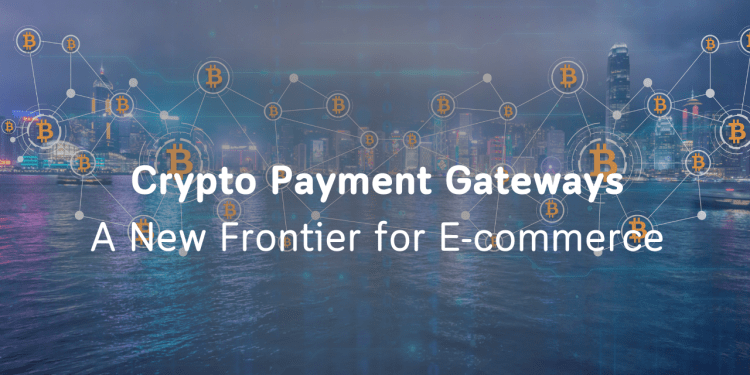In the rapidly evolving landscape of digital commerce, a groundbreaking technology is reshaping the way online businesses handle transactions: crypto payment gateways. As cryptocurrencies gain mainstream acceptance, e-commerce platforms are increasingly looking to integrate these innovative payment solutions to stay ahead of the curve and cater to a growing segment of tech-savvy consumers. This comprehensive guide delves into the world of crypto payment gateways, exploring their potential to revolutionize e-commerce and examining the opportunities and challenges they present for online businesses.
What are Crypto Payment Gateways?
Crypto payment gateways are specialized financial services that enable e-commerce businesses to accept cryptocurrencies as a form of payment for goods and services. These gateways act as intermediaries between merchants and customers, facilitating the seamless conversion of digital assets like Bitcoin, Ethereum, and other altcoins into traditional fiat currencies.
Much like traditional payment processors, crypto payment gateways handle the complex backend operations necessary to complete a transaction. However, they’re specifically designed to work with blockchain-based digital currencies, offering unique features and benefits that set them apart from conventional payment methods.
The Rise of Cryptocurrency in E-commerce
The integration of cryptocurrencies into e-commerce has been gaining momentum in recent years, driven by several key factors:
- Increased Crypto Adoption: As more people invest in and use cryptocurrencies, there’s a growing demand for ways to spend these digital assets in everyday transactions.
- Technological Advancements: Improvements in blockchain technology have made crypto transactions faster, cheaper, and more scalable, making them viable for e-commerce applications.
- Global Accessibility: Cryptocurrencies offer a borderless payment solution, allowing businesses to easily tap into international markets without the complexities of traditional cross-border transactions.
- Financial Inclusion: Crypto payments can provide access to e-commerce for unbanked or underbanked populations who may not have access to traditional banking services.
- Security and Privacy Concerns: The pseudonymous nature of crypto transactions appeals to consumers who are increasingly concerned about data privacy and security in online shopping.
As these trends continue to converge, the adoption of crypto payment gateways in e-commerce is poised for significant growth in the coming years.
Benefits of Crypto Payment Gateways for Online Businesses
Integrating crypto payment gateways into an e-commerce platform offers several compelling advantages for businesses:
1. Lower Transaction Fees
Cryptocurrency transactions typically incur lower fees compared to traditional payment methods like credit cards. This can result in significant savings for businesses, especially those dealing with high transaction volumes or operating on thin profit margins.
2. Reduced Fraud and Chargebacks
The immutable nature of blockchain transactions means that once a payment is confirmed, it cannot be reversed without the merchant’s consent. This greatly reduces the risk of fraudulent chargebacks, a common problem in e-commerce.
3. Faster Settlement Times
Crypto transactions can be settled much more quickly than traditional bank transfers, often within minutes or hours rather than days. This improved cash flow can be particularly beneficial for small and medium-sized enterprises.
4. Global Market Access
By accepting cryptocurrencies, businesses can easily cater to an international customer base without the need for complex currency conversion processes or dealing with multiple payment providers.
5. Appeal to Tech-Savvy Customers
Offering cryptocurrency payment options can attract a growing demographic of tech-savvy consumers who prefer using digital assets for online purchases.
6. Enhanced Security
Blockchain technology provides robust security features, reducing the risk of payment fraud and data breaches associated with storing sensitive customer financial information.
7. Potential for Increased Sales
By offering additional payment options, businesses may see an increase in conversion rates and overall sales volume.
Popular Crypto Payment Gateway Solutions
Several companies have emerged as leaders in the crypto payment gateway space, offering a range of features and services tailored to e-commerce needs:
- BitPay: One of the oldest and most established crypto payment processors, BitPay supports a wide range of cryptocurrencies and offers seamless integration with popular e-commerce platforms.
- Coinbase Commerce: Leveraging the reputation of the Coinbase exchange, this solution provides an easy way for merchants to accept major cryptocurrencies with low fees.
- CoinGate: Offers support for over 50 cryptocurrencies and provides options for both automatic conversion to fiat and holding crypto assets.
- BTCPay Server: An open-source, self-hosted payment processor that gives merchants full control over their payment infrastructure without relying on third-party services.
- Crypto.com Pay: Provides a user-friendly solution for accepting crypto payments with the added benefit of integration with the popular Crypto.com ecosystem.
Each of these solutions offers unique features and pricing structures, catering to different business needs and levels of crypto expertise.
How Crypto Payment Gateways Work
Understanding the mechanics of crypto payment gateways is crucial for e-commerce businesses considering their implementation. Here’s a step-by-step breakdown of a typical crypto payment process:
- Customer Initiates Payment: The customer selects the crypto payment option at checkout and chooses their preferred cryptocurrency.
- Gateway Generates Payment Request: The payment gateway creates a unique payment address and displays the exact amount of cryptocurrency required, often with a QR code for easy scanning.
- Customer Sends Crypto: Using their wallet, the customer sends the specified amount of cryptocurrency to the provided address.
- Transaction Verification: The payment gateway monitors the blockchain for the transaction and waits for the required number of confirmations.
- Payment Confirmation: Once verified, the gateway confirms the payment to both the merchant and the customer.
- Currency Conversion (Optional): If the merchant opts for immediate conversion to fiat currency, the gateway performs this conversion at the current exchange rate.
- Settlement: The funds (in cryptocurrency or fiat) are transferred to the merchant’s account according to the agreed-upon schedule.
This process happens quickly, often within minutes, providing a seamless experience for both the customer and the merchant.
Integrating Crypto Payments into Your E-commerce Platform
Implementing crypto payment gateways into an existing e-commerce setup is typically a straightforward process, thanks to the robust integrations offered by most providers. Here are the general steps involved:
- Choose a Gateway Provider: Select a crypto payment gateway that aligns with your business needs, considering factors like supported cryptocurrencies, fees, and integration options.
- Sign Up and Verify: Create an account with the chosen provider and complete any necessary verification processes.
- Integration: Depending on your e-commerce platform, you may have access to plugins or APIs for easy integration. Popular platforms like Shopify, WooCommerce, and Magento often have ready-made solutions.
- Customize Settings: Configure your payment options, including which cryptocurrencies to accept and whether to automatically convert to fiat currency.
- Testing: Thoroughly test the payment process to ensure smooth functionality before going live.
- Launch and Monitor: After launching, closely monitor transactions and gather customer feedback to optimize the payment experience.
It’s worth noting that while many gateways offer user-friendly solutions, businesses may benefit from consulting with blockchain developers or integration specialists to ensure a smooth implementation, especially for more complex setups.
Security Considerations for Crypto Payment Gateways
Security is paramount in e-commerce, and crypto payment gateways introduce both new safeguards and potential risks that businesses must consider:
Advantages:
- Encryption: Blockchain transactions are secured by advanced cryptographic techniques, making them extremely difficult to hack or falsify.
- No Sensitive Data Storage: Unlike credit card transactions, crypto payments don’t require merchants to store sensitive customer financial data, reducing the risk of data breaches.
- Immutable Transaction Records: The blockchain provides a tamper-proof record of all transactions, aiding in dispute resolution and auditing.
Challenges:
- Wallet Security: Businesses must ensure the security of their cryptocurrency wallets, as lost private keys can result in irretrievable loss of funds.
- Volatility Management: The value of cryptocurrencies can fluctuate rapidly, potentially affecting the real value of received payments.
- Regulatory Compliance: Adhering to evolving cryptocurrency regulations and KYC/AML requirements can be complex and vary by jurisdiction.
To mitigate these risks, businesses should:
- Implement robust security practices for storing and managing cryptocurrency.
- Consider using multi-signature wallets for added security.
- Regularly update and patch all systems involved in the payment process.
- Educate staff on crypto security best practices and potential threats.
- Work with reputable payment gateway providers that prioritize security and compliance.
Regulatory Landscape and Compliance
The regulatory environment surrounding cryptocurrency payments is complex and rapidly evolving. E-commerce businesses integrating crypto payment gateways must navigate a patchwork of regulations that can vary significantly by country and region. Key considerations include:
- KYC and AML Regulations: Many jurisdictions require businesses accepting crypto payments to implement Know Your Customer (KYC) and Anti-Money Laundering (AML) procedures.
- Tax Implications: The tax treatment of cryptocurrency transactions can be complex and varies by country. Businesses must ensure proper reporting and compliance with local tax laws.
- Consumer Protection Laws: As crypto payments become more mainstream, regulators are increasingly focused on ensuring adequate consumer protections are in place.
- Licensing Requirements: Some jurisdictions may require specific licenses or registrations for businesses handling cryptocurrency transactions.
- Cross-Border Regulations: International transactions may be subject to additional regulatory scrutiny and reporting requirements.
To navigate this complex landscape, businesses should:
- Stay informed about regulatory developments in their operating jurisdictions.
- Consult with legal experts specializing in cryptocurrency and e-commerce law.
- Choose payment gateway providers that prioritize regulatory compliance and offer support in this area.
- Implement robust record-keeping practices to facilitate compliance and auditing.
Challenges and Limitations of Crypto Payment Gateways
While crypto payment gateways offer numerous benefits, they also come with certain challenges that businesses should be aware of:
- Volatility: The value of cryptocurrencies can fluctuate significantly, potentially affecting the real value of transactions. This can be mitigated through immediate conversion to fiat currency, but may still pose a risk.
- User Adoption: Despite growing popularity, cryptocurrency use is still not widespread among all consumer demographics. This may limit the initial impact of implementing crypto payments.
- Technical Complexity: Understanding and managing cryptocurrency transactions requires a certain level of technical knowledge, which may be a barrier for some businesses.
- Integration Challenges: Depending on the e-commerce platform and chosen gateway, integration may require significant development resources.
- Scalability Issues: Some blockchain networks, particularly during peak times, may experience slower transaction speeds or higher fees, potentially affecting the user experience.
- Regulatory Uncertainty: The evolving regulatory landscape around cryptocurrencies can create uncertainty and potential compliance challenges for businesses.
- Irreversibility of Transactions: While beneficial for preventing fraud, the irreversible nature of crypto transactions can make resolving customer disputes more challenging.
Despite these challenges, many businesses find that the benefits of crypto payment gateways outweigh the potential drawbacks, especially as the technology and regulatory environment continue to mature.
Future Trends in Crypto Payments for E-commerce
The intersection of cryptocurrency and e-commerce is a rapidly evolving space, with several exciting trends on the horizon:
- Stablecoin Integration: The rise of stablecoins, cryptocurrencies pegged to stable assets like the US dollar, may provide a solution to volatility concerns while retaining the benefits of crypto payments.
- Lightning Network and Layer 2 Solutions: These technologies promise to significantly improve the speed and reduce the cost of cryptocurrency transactions, making them more viable for small, everyday purchases.
- Central Bank Digital Currencies (CBDCs): As governments explore issuing their own digital currencies, these could potentially be integrated into e-commerce payment systems, blending the benefits of crypto with the stability of fiat currencies.
- Increased Mobile Integration: As mobile commerce continues to grow, we can expect to see more seamless integration of crypto payments into mobile shopping apps and digital wallets.
- AI and Machine Learning: These technologies may be employed to enhance fraud detection, optimize exchange rates, and improve the overall efficiency of crypto payment systems.
- Decentralized Finance (DeFi) Integration: The growing DeFi ecosystem could offer new possibilities for e-commerce, such as decentralized escrow services or innovative financing options for purchases.
- Enhanced Privacy Features: As privacy concerns grow, we may see the development of payment solutions that leverage privacy-focused cryptocurrencies or zero-knowledge proof technologies.
These trends suggest that crypto payment gateways will continue to evolve, offering increasingly sophisticated and user-friendly solutions for e-commerce businesses.
Case Studies: Successful Implementation of Crypto Payment Gateways
Examining real-world examples of businesses successfully implementing crypto payment gateways can provide valuable insights:
Case Study 1: Overstock.com
One of the first major retailers to accept Bitcoin, Overstock.com began accepting cryptocurrency payments in 2014. The company reported several benefits:
- Attracting new, tech-savvy customers
- Lower transaction fees compared to credit card payments
- Positive media attention and brand positioning as an innovative retailer
Case Study 2: Shopify
E-commerce platform Shopify has partnered with several crypto payment gateways, allowing its merchants to easily accept cryptocurrency payments. Benefits reported by Shopify merchants include:
- Expanded global reach, particularly in markets with limited access to traditional banking
- Reduced fraud and chargeback rates
- Increased sales from crypto-enthusiast customers
Case Study 3: Newegg
Electronics retailer Newegg has been accepting Bitcoin since 2014 and has since expanded to other cryptocurrencies. The company has noted:
- Increased customer loyalty among crypto users
- Competitive advantage in the tech-oriented consumer electronics market
- Simplified international transactions
These case studies demonstrate that when implemented effectively, crypto payment gateways can offer tangible benefits to e-commerce businesses across various sectors.
Tips for Choosing the Right Crypto Payment Gateway
Selecting the appropriate crypto payment gateway is crucial for ensuring a smooth integration and maximizing the benefits for your e-commerce business. Consider the following factors:
- Supported Cryptocurrencies: Ensure the gateway supports the cryptocurrencies most relevant to your target market.
- Integration Options: Look for gateways that offer easy integration with your existing e-commerce platform and tech stack.
- Fees and Pricing Structure: Compare transaction fees, conversion rates, and any subscription costs across different providers.
- Settlement Options: Consider whether you prefer immediate conversion to fiat currency or the ability to hold cryptocurrency.
- Security Features: Evaluate the security measures and insurance policies offered by the gateway provider.
- Regulatory Compliance: Choose a provider that helps ensure compliance with relevant regulations in your operating jurisdictions.
- Customer Support: Assess the level and quality of customer support offered, particularly if you’re new to handling crypto payments.
- User Experience: Consider the checkout process from the customer’s perspective, ensuring it’s smooth and user-friendly.
- Scalability: Ensure the gateway can handle your current transaction volume and scale with your business growth.
- Reputation and Track Record: Research the provider’s history, user reviews, and standing in the crypto community.
By carefully evaluating these factors, you can select a crypto payment gateway that aligns with your business needs and helps you capitalize on the benefits of accepting cryptocurrency payments.
Conclusion
Crypto payment gateways represent a new frontier in e-commerce, offering a range of benefits including lower fees, faster settlements, enhanced security, and access to a global market of cryptocurrency users. While challenges such as volatility and regulatory complexity exist, the potential advantages make crypto payments an increasingly attractive option for forward-thinking online businesses.
As the technology continues to evolve and mature, we can expect to see more innovative solutions addressing current limitations and opening up new possibilities for e-commerce. From improved transaction speeds and reduced volatility through stablecoins to enhanced privacy features and integration with emerging technologies like AI and DeFi, the future of crypto payments in e-commerce looks promising.
For businesses considering the implementation of crypto payment gateways, it’s crucial to carefully evaluate the options, understand the regulatory landscape, and choose a solution that aligns with their specific needs and goals. By doing so, they can position themselves at the forefront of this exciting intersection of cryptocurrency and e-commerce, ready to capitalize on the opportunities it presents.
As we move further into the digital age, crypto payment gateways are likely to play an increasingly important role in shaping the future of online commerce, offering new ways for businesses to connect with customers and streamline their operations in an increasingly borderless digital economy.













